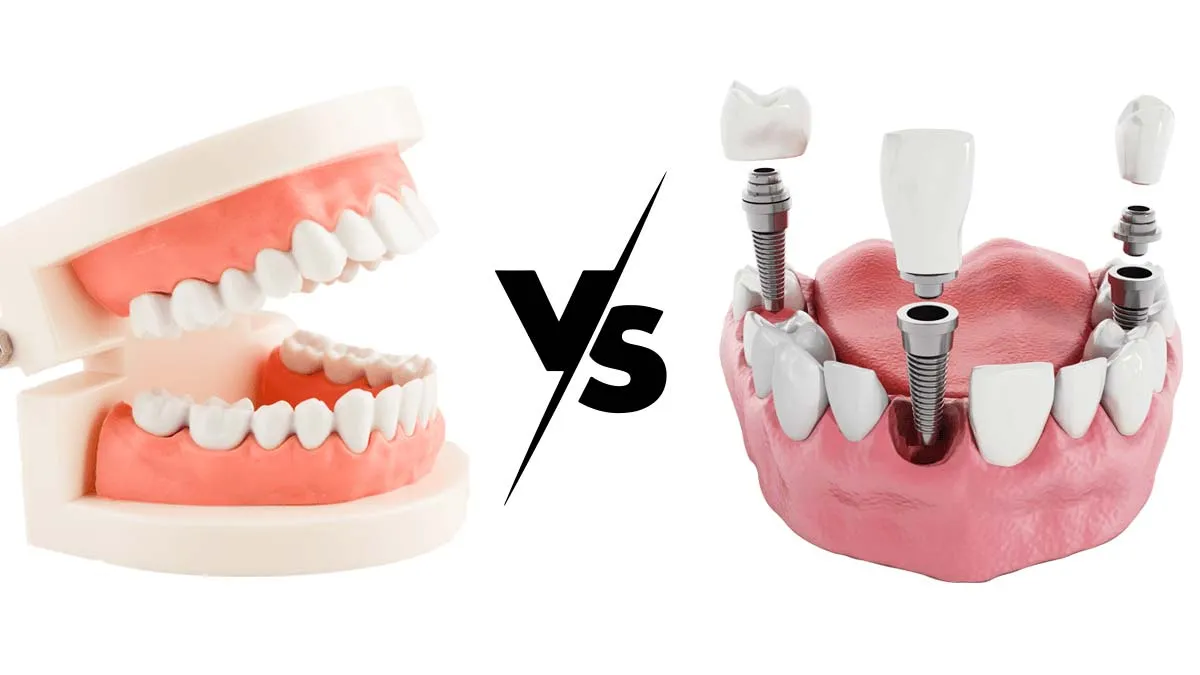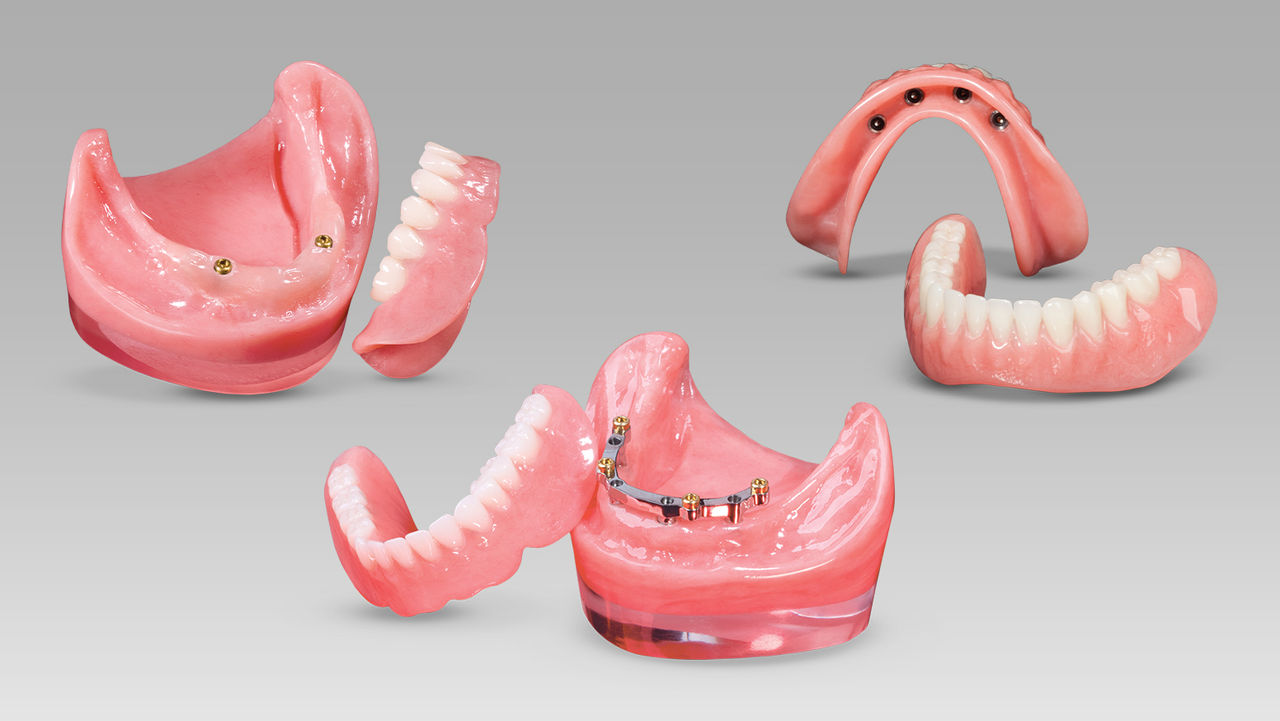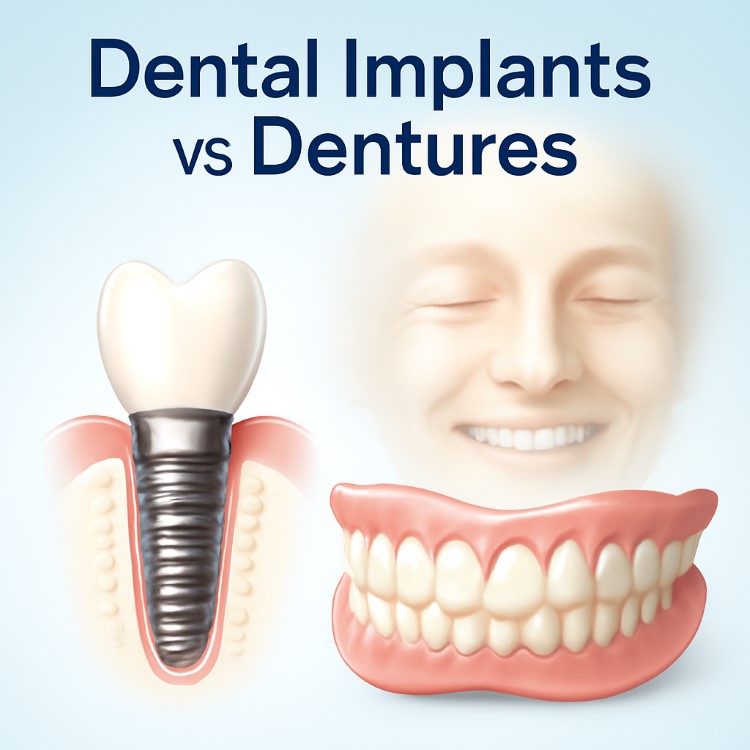The Choice That Changes Your Smile
Missing teeth can take a considerable toll on your self-esteem and your ability to enjoy food naturally. Fortunately, modern dentistry offers two primary, reliable solutions to help you restore function and smile again: dental implants vs dentures.
But what is the definitive difference? And more importantly, which option offers the best long-term value, stability, and results?
This ultimate guide provides a transparent comparison of dentures vs dental implants. We will discuss the primary differences, break down the upfront and long-term dental implants vs dentures cost, and offer clear guidance on whether implants, traditional dentures, or implant-supported dentures may be the best fit for your oral health needs and lifestyle.
Understanding the Basics: Implants vs. Traditional Solutions
To make an informed decision, you must first understand the fundamental mechanics of each treatment.
What Are Dental Implants? (The Foundation)
A dental implant is a titanium screw placed surgically into the jawbone to function as a tooth root. After a healing period (osseointegration), either a crown (for a single tooth) or a full denture is securely attached onto the implant. Because they fuse with the bone, implants offer unparalleled stability.
What Are Dentures? (The Removable Appliance)
Dentures are removable appliances typically constructed from acrylic, plastic, or metal used to replace lost teeth. They simply rest on your gums (gums-supported) and come in full or partial sets, depending on how many teeth are being replaced.
Implant-Supported Dentures (The Hybrid Solution)
Those looking for more security than any traditional set of dentures can offer might find implant-supported dentures suitable. They fasten firmly to the implants, conferring the affordability of dentures with the high reliability of implants.
Cost Considerations: Dental Implants vs Dentures Cost (The Financial Breakdown)

Cost is often the biggest factor when choosing between dental implants vs dentures. It is vital to compare not just the upfront price, but the long-term investment.
| Solution | Upfront Cost (UK Estimate) | Longevity / Replacement Frequency | Key Cost Factor |
| Single Implant | £2,000 to £3,500 per implant | Can last a lifetime (crown replaced every 15–20 yrs) | Surgical procedure, materials (titanium) |
| Full Arch (All-on-4) | £10,000 to £20,000 per arch | Excellent longevity (Denture replaced every 15–20 yrs) | Number of implants (typically 4-6) |
| Traditional Dentures | £300 to £1,000 per set | 5–8 years | Bone changes require frequent adjustments and replacement |
Key Takeaway: While traditional dentures are significantly more affordable upfront, the cost of recurrent adjustments, replacements (every 5-8 years), and adhesives can quickly add up, making implants more cost-effective over a 15-to-20-year period.
Stability, Longevity, and Bone Health: Pros and Cons Comparison
| Feature | Dental Implants (Pros) | Traditional Dentures (Cons) |
| Stability & Function | Excellent. Fuses with the jawbone; eliminates slipping; improves chewing efficiency (like natural teeth). | Poor. Tend to move, slip, or feel uncomfortable when speaking or eating. |
| Bone Health | Preserved. Implants stimulate the jawbone and prevent bone loss. | Compromised. Lack of stimulation causes the jawbone to dissolve, altering the face shape. |
| Longevity | Permanent. Can last a lifetime with proper care (implant component). | Temporary. Require regular adjustments or replacement within 5–8 years. |
| Maintenance | Easy. Maintained with regular brushing and flossing. No adhesives needed. | Difficult. Requires regular removal, soaking, and use of messy adhesives. |
| Procedure | Requires surgery and 3-6 months of healing time. | Quick to fit; few surgical requirements. |
| Expense | Higher initial out-of-pocket expense. | Lower initial upfront cost (affordability). |
Types of Implant-Supported Dentures: Fixed vs. Removable

When considering the security of an implant foundation, you’ll find two primary types of implant-supported dentures:
1. Removable Implant-Supported Dentures (Snap-On)
How they work: These “snap-on” dentures click easily into place on the implants.
Maintenance: You can take them out daily for cleaning, making them practical and low-maintenance. This is perfect for those who value flexibility in their oral hygiene routine.
2. Fixed Implant-Supported Dentures (Hybrid/Permanent)
How they work: These are permanently secured to the implants (often referred to as hybrid dentures) and cannot be removed at home.
Maintenance: Cleaning them is similar to natural teeth, using interproximal brushes and floss threaders. While they provide incredible stability, they do require professional upkeep.
Who Is Suitable for Each Option?
Dental Implants
Great For: Patients with sufficient jawbone density and those prioritizing long-term durability, stability, and function.
Not Ideal For: Smokers or individuals with unmanaged health issues like severe diabetes or active gum disease, as these conditions compromise healing.
Dentures
Ideal For: Those seeking a quick and affordable fix for tooth loss, or those who may not have enough jawbone density for immediate implant surgery.
Implant-Supported Dentures
A Balance For: Those wanting a mix of comfort, excellent stability, and a more accessible price point than full mouth implant reconstructions.
The Procedure for Implant-Supported Dentures
Here is a brief overview of what the process entails if you opt for the implant route:
Pre-Surgical Planning: Your dentist conducts scans and assessments. This may involve a dental bone graft to rebuild jawbone density if needed.
Implant Placement: Implants are surgically inserted into the jawbone. Healing takes several months (osseointegration) during which the implant integrates with the bone.
Impressions: Once fully healed, impressions of your mouth are taken to craft your custom dentures or crown.
Placement: Finally, your permanent dentures or crown are securely attached, completing your new smile.
Long-Term Benefits of Choosing Implants
Dental implants go beyond just aesthetics, offering measurable advantages for your oral and overall health:
Improved Diet: Enhanced chewing strength allows you to enjoy a wider variety of nutritious foods that may be difficult to eat with traditional dentures.
Preserved Facial Structure: Preventing bone loss maintains a youthful and natural facial profile as you age.
Boosted Confidence: A secure, fixed, and natural-looking smile significantly elevates self-esteem.
FAQS
Are dentures better than implants?
Generally, no. While dentures are cheaper initially, implants offer superior stability, function, bone health preservation, and are significantly more cost-effective over the long term due to their permanence.
Why do dentists discourage dentures?
Dentists prioritize long-term oral health. Traditional dentures accelerate bone loss in the jaw, leading to facial structure changes and the need for frequent replacement, which implants prevent entirely.
Why would a dentist not recommend an implant?
The primary reasons are insufficient jawbone density (which may require pre-procedures like bone grafting) or unmanaged systemic health issues like uncontrolled diabetes, which can compromise the implant’s ability to integrate with the bone.
What is the downside to having dentures?
The main downsides are instability (slipping when eating/talking), limited chewing efficiency, discomfort, and accelerating the natural loss of jawbone tissue over time, which requires frequent adjustments
Conclusion: Making an Informed Decision
There are advantages to both implants and dentures in modern dentistry. Your choice ultimately depends on your lifestyle, budget, and personal oral health needs.
For most patients, the long-term benefits of implant-supported dentures—including superior stability, function, and preservation of jawbone health—far outweigh the lower upfront cost of conventional dentures.
If you’re unsure which decision is right for you, consult your dentist. They will guide you based on your specific goals and oral health needs, ensuring you make an informed choice.
With the right treatment, you can restore not only your smile but also your confidence and overall quality of life. For international patients, Aesthetic Airways also provides medical tourism services, making it easy to combine your dental care with a comfortable stay in Turkey.

